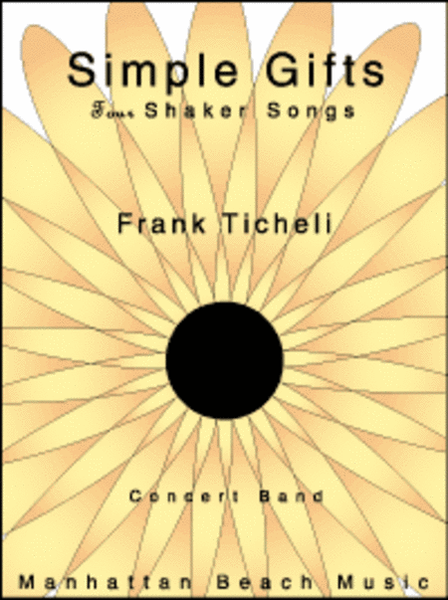Simple Gifts: Four Shaker Songs
-
Ships in 4 to 6 weeks
Details
Description
SKU: MH.0-931329-72-8
Composed by Frank Ticheli. Suitable for advanced middle school, high school, community and college bands. Conductor Full Score. Duration 9:00. Published by Manhattan Beach Music (MH.0-931329-72-8).ISBN 9780931329722.
From the delicate daybreak of "In Yonder Valley," we traverse a jaunty dance, then a warm harvest hymn, to arrive at the work's stunning set of variations on "Simple Gifts" - diverse, resourceful, resplendent. The Shakers were a religious sect who splintered from a Quaker community in the mid-1700's in Manchester, England. Known then derisively as "Shaking Quakers" because of the passionate shaking that would occur during their religious services, they were viewed as radicals, and their members were sometimes harassed and even imprisoned by the English. One of those imprisoned, Ann Lee, was named official leader of the church upon her release in 1772. Two years later, driven by her vision of a holy sanctuary in the New World, she led a small group of followers to the shores of America where they founded a colony in rural New York. The Shakers were pacifists who kept a very low profile, and their membership increased only modestly during the decades following their arrival. At their peak in the 1830's, there were some 6,000 members in nineteen communities interspersed between Maine and Kentucky. Soon after the Civil War their membership declined dramatically. Their practice of intense simplicity and celibacy accounts for much of their decline. Today there is only one active Shaker community remaining, the Sabbathday Lake Shaker Village in New Gloucester, Maine. The Shakers were known for their architecture, crafts, furniture, and perhaps most notably, their songs. Shaker songs were traditionally sung in unison without instrumental accompaniment. Singing and dancing were vital components of Shaker worship and everyday life. Over 8,000 songs in some 800 songbooks were created, most of them during the 1830's to 1860's in Shaker communities throughout New England. PROGRAM NOTES: My work is built from four Shaker melodies - a sensuous nature song, a lively dance tune, a tender lullaby, and most famously, "Simple Gifts," the hymn that celebrates the Shaker's love of simplicity and humility. In setting these songs, I sought subtle ways to preserve their simple, straightforward beauty. Melodic freshness and interest were achieved primarily through variations of harmony, of texture, and especially, of orchestration. The first movement is a setting of "In Yonder Valley", generally regarded to be the oldest surviving Shaker song with text. This simple hymn in praise of nature is attributed to Father James Whittaker (1751 - 87), a member of the small group of Shakers who emigrated to America in 1774. My setting enhances the image of spring by turning the first three notes of the tune into a birdcall motive. The second movement, "Dance," makes use of a tune from an 1830's Shaker manuscript. Dancing was an important part of Shaker worship, and tunes such as this were often sung by a small group of singers while the rest of the congregation danced. One interesting feature in my setting occurs near the end of the movement, when the brasses state the tune at one-quarter speed in counterpoint against the woodwinds who state it at normal speed. The third movement is based on a Shaker lullaby, "Here Take This Lovely Flower," found in Dorothy Berliner Commin's extraordinary collection, Lullabies of the World. and in Daniel W. Patterson's monumental collection, The Shaker Spiritual. This song is an example of the phenomenon of the gift song, music received from spirits by Shaker mediums while in trance. Although the Shakers practiced celibacy, there were many children in their communities, including the children of recent converts as well as orphans whom they took in. Like many Shaker songs, this lullaby embodies the Shakers' ideal of childlike simplicity. The finale is a setting of the Shakers' most famous song, "Simple Gifts," sometimes attributed to Elder Joseph Bracket (1797 - 1882) of the Alfred, Maine community, and also said (in Lebanon, New York, manuscript) as having been received from a Negro spirit at Canterbury, New Hampshire, making "Simple Gifts" possibly a visionary gift song. It has been used in hundreds of settings, most notably by Aaron Copland in the brilliant set of variations which conclude his Appalachian Spring. Without ever quoting him, my setting begins at Copland's doorstep, and quickly departs. Throughout its little journey, the tune is never abandoned, rarely altered, always exalted. Ensemble instrumentation: 4 Flute 1/Piccolo, 4 Flute 2, 2 Oboe, 4 Bb Clarinet 1, 4 Bb Clarinet 2, 4 Bb Clarinet 3, 2 Bb Bass Clarinet, 2 Bassoon, 2 Eb Alto Saxophone 1, 2 Eb Alto Saxophone 2, 2 Bb Tenor Saxophone, 2 Eb Baritone Saxophone, 3 Bb Trumpet 1, 3 Bb Trumpet 2, 3 Bb Trumpet 3, 4 F Horn, 3 Trombone 1, 3 Trombone 2, 3 Euphonium B.C., 2 Euphonium T.C., 4 Tuba, 2 Timpani, 2 Percussion 1, 2 Percussion 2, 2 Percussion 3.

 Share
Share